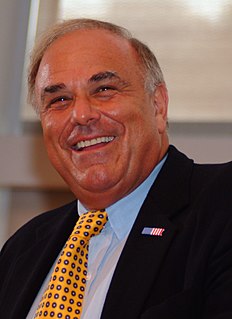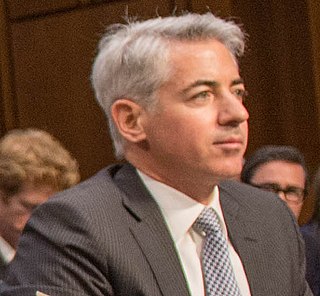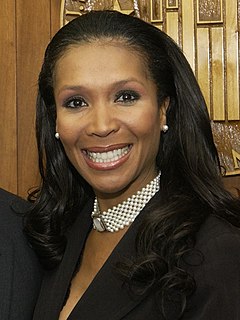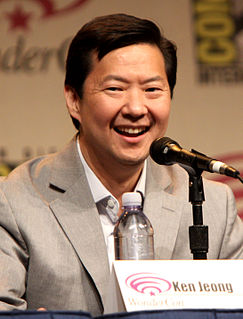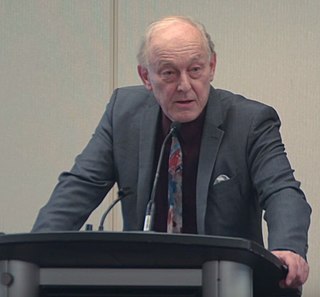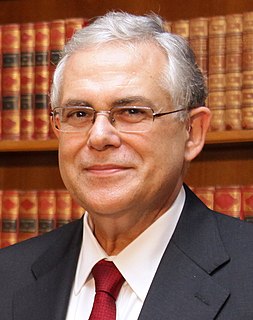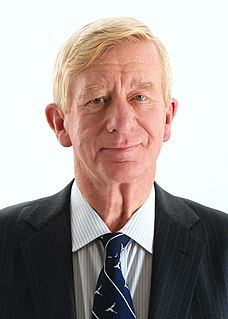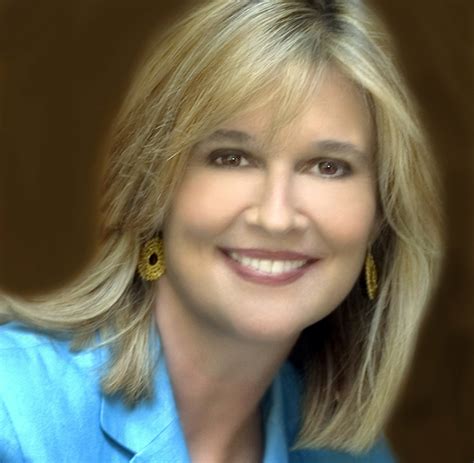Top 1200 Economic Issues Quotes & Sayings - Page 15
Explore popular Economic Issues quotes.
Last updated on December 19, 2024.
I believe that the behavior of too many of our corporations investment bankers and fund managers has jeopardized some of the trust that investors have had. It's not the economic engine that we need to focus on, but the need to make sure that our investors receive their fair share of the returns that that great economic system produces.
The specter of climate change threatens worsening natural disasters, rapid urbanization, forced migration, and economic hardship for the most vulnerable. Despite significant global advances, inability to effectively address epidemics and health emergencies still prevail and continuously threaten global health security and economic development.
To be equitable, economic growth has to be sustainable. To be sustainable, economic growth has in turn to be all-inclusive. All-inclusive is no longer the greatest good of the greatest number. It is actually 'Sarvodaya' or the 'rise of all'. This Mahatma Gandhi saw as essential to Satyagraha itself.
The Panic of 1819 exerted a profound effect on American economic thought. As the first great financial depression, similar to a modern expansion-depression pattern, the panic heightened interest in economic problems, and particularly those problems related to the causes and cures of depressed conditions.
It would be a mistake to overstate the similarities between the Brexit vote and Trump's win - but there are common themes, not least in the rallying cries that the winning campaigns used. They focused on a supposed economic threat posed by outsiders, as immigrants or as trade partners. This fuelling of anxieties underpinned a narrative centered on the need to "regain control," whether of borders or of economic forces.
In many respects, we now live in a society that is only formally democratic, as the great mass of citizens have minimal say on the major public issues of the day, and such issues are scarcely debated at all in any meaningful sense in the electoral arena. In our society, corporations and the wealthy enjoy a power every bit as immense as that assumed to have been enjoyed by the lords and royalty of feudal times.
I think national issues play into gubernatorial races less than, obviously, in Senate and Congressional races. Much less. They tend to be more decided by personality, leadership qualities and by state or local issues. They still have some effect, no question about it, but not as much as Senate and Congressional races.
Part of my advantage is that my strength is economic forecasting, but that only works in free markets, when markets are smarter than people. That's how I started. I watched the stock market, how equities reacted to change in levels of economic activity, and I could understand how price signals worked and how to forecast them.
Standing athwart ineffective, feel-good legislation shouting, 'Stop!' is seen as a betrayal of those struggling to get their footing on the lowest rung of the economic ladder. Yet raising the minimum wage hacks the lowest rungs off the ladder altogether. But economic logic doesn't wash with liberals who are intent on inflaming class warfare.
I think when it comes to the issues, I'd advise him to stick to the script. But, I mean, Donald Trump is going to have some very tough conversations and he's going to be talking about some very tough and complicated issues in all of the places that he visits.I think anytime a president does things that are humanizing, I think it's - it's good.
The earliest issue I can remember going through was body image issues. I was a chubby little kid and I got made fun of for it. I dealt with horrible, horrible self esteem issues, and I still struggle with that. I think it's what taught me a lot of empathy and compassion, though, but there are those days where I look in the mirror and I still see twelve year old fat Sara.
It's important in our role as leaders that we use the platform to address issues, to address barriers, to identify best practices for overcoming these challenges with businesses small and large. Maybe there are some public policy issues that we need to address. Maybe some of them are at the federal level and some are at the state or local level.
The achievements of past struggles and the aspirations of an entire nation are [being] undone and erased.... No Agent Orange or steel pellet bombs, no napalm, no toxic chemicals: a new phase of economic and social (rather than' physical) destruction has unfolded. The seemingly neutral and scientific tools of macro-economic policy constitute a non-violent instrument of recolonization and impoverishment.
Economic growth is the key to everything. But once you have economic growth, it is important that we reach out to people who live in the shadows, the people who don't seem to ever think that they get a fair deal. And that includes people in our minority community; that includes people who feel as though they don't have a chance to move up.
I would be remiss, as a scientist who studied this, if I didn't mention the following two things: The first is that, most importantly, we need to do, as a society, in this country and globally, whatever we can to reduce population"....."Our whole economic system is based on growth, and growth of our population, and this economic madness has to end.
I was really happy in the Globe and - in the Globe and Mail debate, which was on the economy, that there were questions about infrastructure, about immigration, about housing. These things have often been seen as municipal issues, but they truly are pan-Canadian issues. Now, I'm not saying I'm happy with all the answers, but I'm happy that at least we're talking about them.
Immigrant families have integrated themselves into our communities, establishing deep roots. Whenever they have settled, they have made lasting contributions to the economic vitality and diversity of our communities and our nation. Our economy depends on these hard-working, taxpaying workers. They have assisted America in its economic boom.
Russia and China have maintained that people prize stability over freedom and that as long as the central State creates conditions for economic growth, people will be complacent and will be willing to literally sell away their rights. In fact, this very economic growth will eventually catch up with these regimes.
I'm really excited that the fashion industry is evolving, doing a much better job at representation, with women of color, women of different shapes, sizes, and creeds. It's been a long time coming... There were issues of tokenism, issues of misrepresentation. I'm optimistic that I see the change, the conversation that these archetypes gotta go. We can be very political and have long weaves down to our asses.
We cannot continue to have an excellence gap with the rest of the world and intend to remain the [economic superpower] and [military superpower] of the planet. That's just not going to happen. We're in a position where unless we take action, we'll end up being the [France] of the 21st century: a lot of talk, but not a lot of strength behind it in terms of economic capability.
How is it that we have created an economic system that tells us it is cheaper to destroy the earth and exhaust its people than to nurture them both? Is it rational to have an pricing system which discounts the future and sells off the past? How did we create an economic system that confused capital liquidation with income?
The accepted ideas of any period are singularly those that serve the dominant economic interest...What economists believe and teach, whether in the United States or in the Soviet Union, is rarely hostile to the institutions - the private business enterprise, the Communist Party - that reflect the dominant economic power. Not to notice this takes effort, although many succeed.
I certainly want people to read what I've written. Yet, and here's that question of economic position, because I have a secure job, I don't need a wide readership to survive. I'm a participant in the indirect economy, what sociological critic Pierre Bourdieu would call the "economic world reversed." I get "paid" by writing whatever I choose. That's a pretty good position to be in, but I don't pretend for a moment that it is not a privileged one.
But if we are to retain freedom, then we can only do so by keeping the determining mass of the citizens the possessors of property with personal control over it, as individuals or as families. For property is the necessary condition of economic freedom in the full sense of that term. He that has not property is under economic servitude to him who has property, whether the possessor of it be another individual or the State.
All three of the leaders looked like they were surprised to be asked about housing. And really none of them had anything interesting to say. And so this is something we need to push hard on to ensure that they understand that our housing crisis is really a major economic issue. It's not a social issue; it's an economic issue.
You know in fairness Gary [Johnson] and I have not agreed on a number of substantive issues in this campaign, tax policy, we've had some influence on each other, I think I've had some influence on him, on constructive engagement around the world, he's had some influence on me in criminal justice reform issues.
Every single human being is creative and maximizing that creativity is critical to happiness and economic growth. Economic growth is driven by creativity, so if we want to increase it, we have to tap into the creativity of everyone. That's what makes me optimistic. For the first time in human history, the basic logic of our economy dictates that further economic development requires the further development and use of human creative capabilities. The great challenge of our time is to find ways to tap into every human's creativity.
When we planned our country's economic development, we had the strategic objective of our Revolution in mind. It was not planned for economic development [to be] solely an end in itself. There are some who have forgotten that the sole basis of our revolutionary struggle was the ideology and politics which we follow.
The single biggest stimulus to the economy are the unemployment benefits we're paying. These people go out and they spend the money. They go out and they have to get by to everything from paying their mortgage or buying food or just getting by. It has a significant impact on economic growth and the continuation of economic growth.
One thing that's important to point out is that this kind of populism has a long and mixed history. It's part of this tradition of problematic anti-elitism where the elites are always the liberal class - the intellectuals, the professors, the artists - and not the economic elites. Why are we so mad and aggrieved at newspaper editors but not at corporate executives? I think we need to look more at the latter, at economic elites.
Capitalism, the ogre of those protesting Wall Street, has suffered a public relations crisis in the wake of the global economic collapse. But any remedy to the systemic corruption that led to the collapse should not displace recognition that capitalism creates wealth. Capitalism, and no other economic system, has raised millions from poverty around the world.
Society's double behavioral standard for women and for men is, in fact, a more effective deterrent than economic discrimination because it is more insidious, less tangible. Economic disadvantages involve ascertainable amounts, but the very nature of societal value judgments makes them harder to define, their effects harder to relate.
In the nearer term, the likeliest source of risk is a conflict between China and the U.S. These are now the two largest economies in the world, and the combination of their economic interdependence, the sharp differences in their political and economic values, and the growing divergence in their interests makes this relationship potentially dangerous for everyone who might be affected by it - which means pretty much everyone.
Politicians had always viewed environmental issues as narrow things of no great political consequence. Sort of NIMBY issues. A big part of the reason was that the groups that cared about wilderness didn't talk with the groups that were trying to stop freeways from cutting through inner cities, and neither of them talked to the folks who wanted to stop the military from dumping Agent Orange on Vietnam.
Our economic assistance must be carefully targeted, and must make maximum use of the energy and efforts of the private sector... Economic freedom is the world's mightiest engine for abundance and social justice... Developing countries need to be encouraged to experiment with a growing variety of arrangements for profit sharing and expanded capital ownership.
None of us are rational economic men as we're supposed to be portrayed in economic theory where mixes of passions, of desires, of moral principles, of self-deception, of altruism, of concern of others, of concerns for ourselves and an interest in our bank accounts. And social policies have to be responsive to the complexity of who we are as people or else, like the war on drugs, they're simply going to fail.
I had a lot of issues with the genre, and I probably even had issues with the whole idea of genre. I was coming into it with a certain degree of outsider attitude, and I didn't have a long-term plan. But I think the way it's worked out, it's sort of warped into what I suppose you could say is my own genre. If people like my books, they have some idea of what the next one will be like.
Reasons to be positive. The economic downturn could be the catalyst for positive change. It should be translated into the wake-up call we need for a major change in aspirations and lifestyles to save humanity from the ecological and economic disaster that would otherwise result from continuing on the high carbon and resource depleting path we have been pursuing
It's hard to fully enjoy your time on Earth without having your health. Ask anyone battling health issues - most especially, issues that could have been avoided. For me, I read food labels, I seek out places to purchase the best-quality foods available to me, and I inquire about how they are produced (meats and fruits/vegetables).








